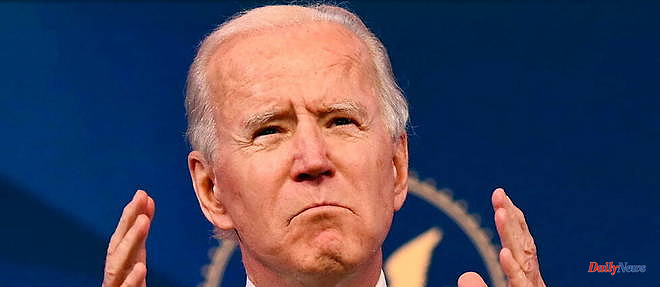The threat still hangs over the United States. 10 days from a possible default, Joe Biden is trying to find a compromise with Kevin McCarthy, the Republican Speaker of the House of Representatives. The two men engage in a veritable showdown both budgetary and political just over a year from the presidential election.
Kevin McCarthy called the exchange "productive", according to American media, and Joe Biden launched that it had "gone well", returning Sunday evening to the White House after a G7 summit in Japan. The 80-year-old Democrat had originally planned to extend his diplomatic tour in Oceania, to assert the American presence in the face of Chinese ambitions, but the politico-budgetary imbroglio in Washington forced him to give up this segment of the trip.
To remove the risk of bankruptcy, Congress – the Senate held by the Democrats and the House with a Republican majority – must vote to raise the maximum authorized public debt ceiling. This parliamentary procedure, long routine, has already given rise to extremely politicized battles under the Obama presidency. This time, the Republicans require, to give their green light, a sharp reduction in public spending. Joe Biden, who is campaigning for reelection in 2024 on a social justice pledge, opposes it.
The conservative camp accuses the White House of being too spendthrift. The presidential party for its part castigates a republican project which would finance tax gifts to the rich by strangling the working classes. Republicans and Democrats, on the other hand, are in unison on one thing: it is the opposing camp that is holding the country "hostage" with the risk of bankruptcy.
Interviewed on CNN, Kevin McCarthy said he was "very confident" in the ability of both sides to avoid default, recalling that, without a cross-party agreement, "the law that raises the ceiling is on the Senate desk". This text, which had been adopted in the House of Representatives, with a Republican majority, however, has little chance of passing the Senate to be adopted, the majority there being Democrats.
McCarthy was positive, however, saying "whatever we negotiate will be seen by a majority of Republicans as the right solution to get us back on track." The American president warned him that he would refuse any agreement that would "endanger the health care of 21 million Americans" or food aid for the most precarious.
If no agreement is reached, an unprecedented default, with potentially catastrophic consequences for the American and global economy, could occur after June 1. The debt ceiling of more than $31 trillion — a world record — was reached several months ago, but the federal government has so far managed the situation through accounting arbitrations. In the event of default, the United States would no longer be able to repay holders of Treasury bills, this king of global finance investments. The government could also no longer pay certain salaries of civil servants, nor pensions for veterans, among others.












